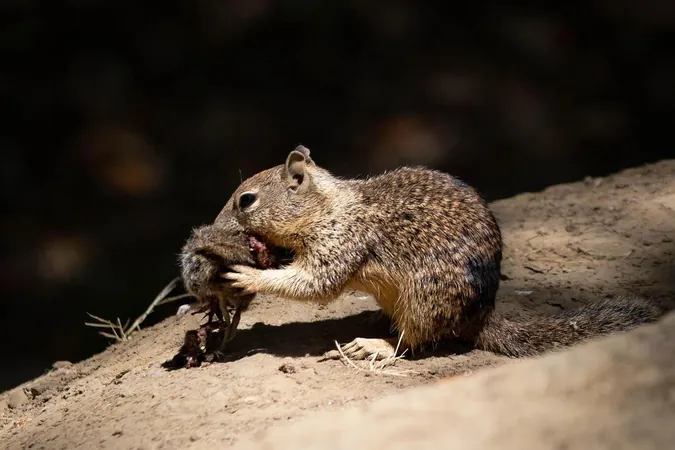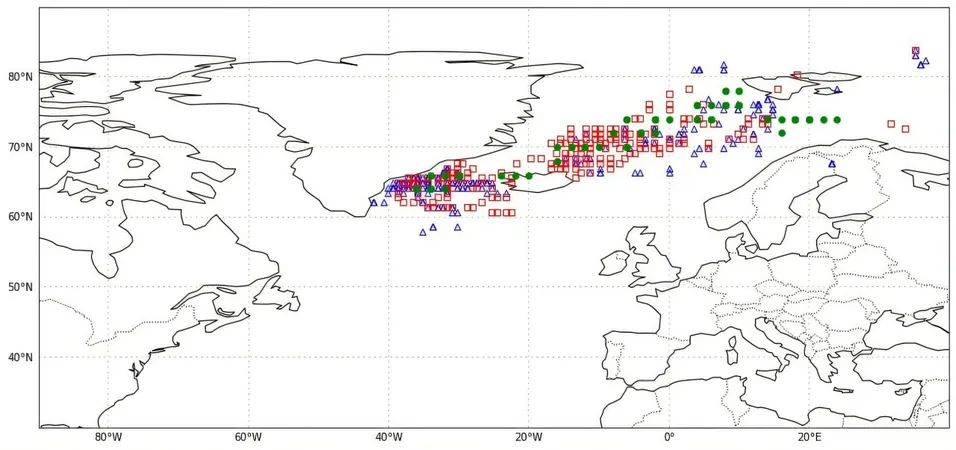
Shocking Discovery: California Squirrels Unleashed as Ruthless Vole Predators!
2024-12-18
Author: Jia
Introduction
In a revelation that has left ecologists astounded, a recent study has uncovered that California squirrels, often perceived as harmless nut-loving creatures, are actually fierce predators that hunt and devour voles. This groundbreaking discovery, published on December 18 in the Journal of Ethology, marks the first comprehensive documentation of such predatory behavior in these furry little animals.
Insights from Researchers
Jennifer E. Smith, the lead author and an associate professor of biology at the University of Wisconsin-Eau Claire, remarked, “Wild animals continue to surprise us. We have so much left to learn about their behaviors, especially in our changing environment.”
The research took place during the summer months of a long-term study at Briones Regional Park in Contra Costa County, California. Between June and July, researchers logged 74 interactions between California ground squirrels and voles, discovering that a staggering 42% of these involved active hunting.
Skepticism Turned Belief
Sonja Wild, a co-author and postdoctoral researcher at the University of California, Davis, initially approached the findings with skepticism. “When my students first reported the hunting behavior, I could barely believe my eyes. However, once we began our observations, it was everywhere—we couldn’t ignore it!” Wild exclaimed.
Hunting Techniques
Previously, it was known that several squirrel species occasionally consume meat—from fish to birds—but it was unclear if they scavenged or actively hunted. This study definitively confirms that hunting behavior is not only present but prevalent among California squirrels.
Researchers documented squirrels using various hunting techniques, including crouching low to ambush their prey and executing rapid chases to pounce on voles, culminating in a gripping neck bite followed by a vigorous shake. Observations indicated that the squirrels’ hunting peaked during the first two weeks of July, aligning with a reported increase in vole populations from citizen scientists using the iNaturalist app.
The Broader Implications
But this story doesn’t end with the squirrels. The adaptability of wildlife, particularly in response to human-driven environmental changes, remains a significant focus for researchers. Animals such as raccoons, coyotes, and even spotted hyenas have been documented modifying their hunting strategies due to habitat loss and urban development—an insight that highlights the resilience of nature.
“In a rapidly changing world, it’s concerning to consider the challenges posed to wildlife by human presence and climate change,” remarked Associate Professor Smith. “However, this study shines a light on the remarkable flexibility some species exhibit, which could offer hope for their survival amidst these pressures.”
Future Research Directions
Despite this exciting discovery, many questions linger regarding the broader implications of this behavior. Researchers aspire to explore how common this hunting behavior is among other squirrel species, the influence of learned behavior from parents to pups, and its overall impact on ecosystem dynamics.
Conclusion
Stay tuned as this unexpected twist in squirrel behavior unfolds and offers tantalizing insights into the adaptability of nature!




 Brasil (PT)
Brasil (PT)
 Canada (EN)
Canada (EN)
 Chile (ES)
Chile (ES)
 España (ES)
España (ES)
 France (FR)
France (FR)
 Hong Kong (EN)
Hong Kong (EN)
 Italia (IT)
Italia (IT)
 日本 (JA)
日本 (JA)
 Magyarország (HU)
Magyarország (HU)
 Norge (NO)
Norge (NO)
 Polska (PL)
Polska (PL)
 Schweiz (DE)
Schweiz (DE)
 Singapore (EN)
Singapore (EN)
 Sverige (SV)
Sverige (SV)
 Suomi (FI)
Suomi (FI)
 Türkiye (TR)
Türkiye (TR)